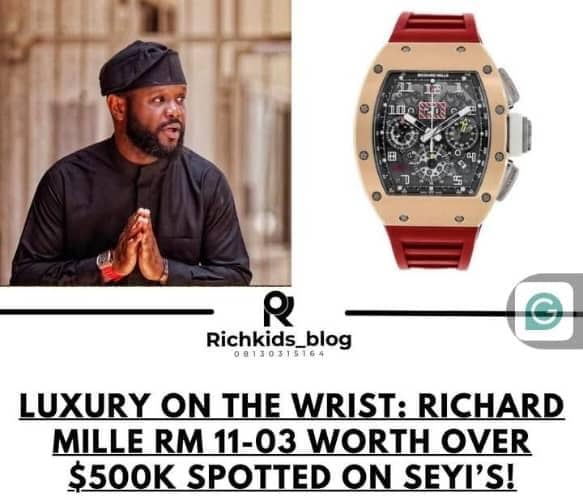By: Joy Musa
In recent times, the lavish lifestyle of Seyi Tinubu has come under intense scrutiny, raising questions about the source of his wealth and the ethical implications of flaunting such opulence while millions of Nigerians suffer under the weight of poverty.
One of the most glaring symbols of his wealth is the Richard Mille RM 11-03 watch, valued at over $500,000, which was recently spotted on his wrist. The sight of such luxury has sparked outrage among the masses, especially when juxtaposed with the dire economic conditions faced by Nigerians today.
While Nigerians are grappling with sky-high inflation, unemployment, and a deteriorating standard of living, Seyi Tinubu’s conspicuous display of wealth stands in stark contrast to the struggles of the everyday citizen.
The fact that he is part of a family closely linked to the ruling All Progressives Congress (APC), the very party whose policies have often been criticized for deepening the divide between the rich and poor, only adds fuel to the fire.
In a country where millions of families are barely able to afford three square meals a day, Seyi Tinubu’s penchant for displaying extreme wealth has left many questioning the integrity behind his fortune.
His actions also raise concerns about the growing disparity between the elite and the general populace, who are increasingly becoming disillusioned with a system that seems to prioritize luxury and privilege for a select few, while the majority languish in poverty.
Adding to the controversy is his recent Ramadan tour to several northern states, where Seyi Tinubu was seen distributing food takeaways to locals in a manner that some have likened to that of a beggar’s handout. Critics argue that this gesture, which many see as patronizing, is a stark contrast to the massive cash and empowerment initiatives he is said to have extended to southern regions.
This unequal treatment of different parts of the country during a sacred religious season has left many questioning his motives and whether he truly understands the needs of the broader Nigerian population.
The irony of this situation is not lost on many. A man who can afford a Richard Mille timepiece worth more than most Nigerians’ entire life savings is seen offering food packages as a form of Ramadan charity to northerners, while southern citizens appear to benefit more from his financial empowerment. It begs the question: Is this an act of genuine charity, or just another attempt to solidify political influence and bolster a carefully crafted public image?
Furthermore, the optics of a man with immense wealth flaunting his luxuries in the face of a nation struggling with corruption, insecurity, and economic decline are deeply troubling. It speaks volumes about the disparity between the elite and the masses, and the message it sends to Nigerians is clear: wealth is to be flaunted, while the suffering of the ordinary citizen goes unnoticed.
The question of Seyi Tinubu’s source of income also remains unanswered. His family’s close ties to the ruling APC are well-documented, and many have speculated that his wealth may be tied to political influence or business ventures closely aligned with the current administration. However, the lack of transparency surrounding his financial activities only raises more questions about the legitimacy of his wealth and the ethical considerations behind his indulgent lifestyle.
At a time when Nigeria is facing unprecedented challenges, the lavish lifestyle of individuals like Seyi Tinubu only serves to further alienate the masses and perpetuate the divide between the rich and poor. His actions are a stark reminder of the deep-rooted inequality that continues to plague the country, and the growing need for a system that prioritizes the welfare of all Nigerians, not just the privileged few.
While it is undeniable that individuals have the right to enjoy the fruits of their labor, there is an ethical responsibility to acknowledge the struggles of those less fortunate. The display of wealth in a country where so many are struggling to survive sends a dangerous message – one that undermines the very essence of fairness and equality. As Nigeria continues to wrestle with its economic challenges, the actions of its political elite, including figures like Seyi Tinubu, must be held to greater scrutiny, especially when their fortunes are inextricably linked to the government currently in power.
The Nigerian people deserve better. They deserve leaders who are willing to invest in their future, to support policies that bridge the gap between the rich and the poor, and to lead with empathy, not excess. It is time for Seyi Tinubu and others in his social circle to reconsider the message they are sending, and whether their display of wealth is truly in alignment with the values that should guide a nation in crisis.







